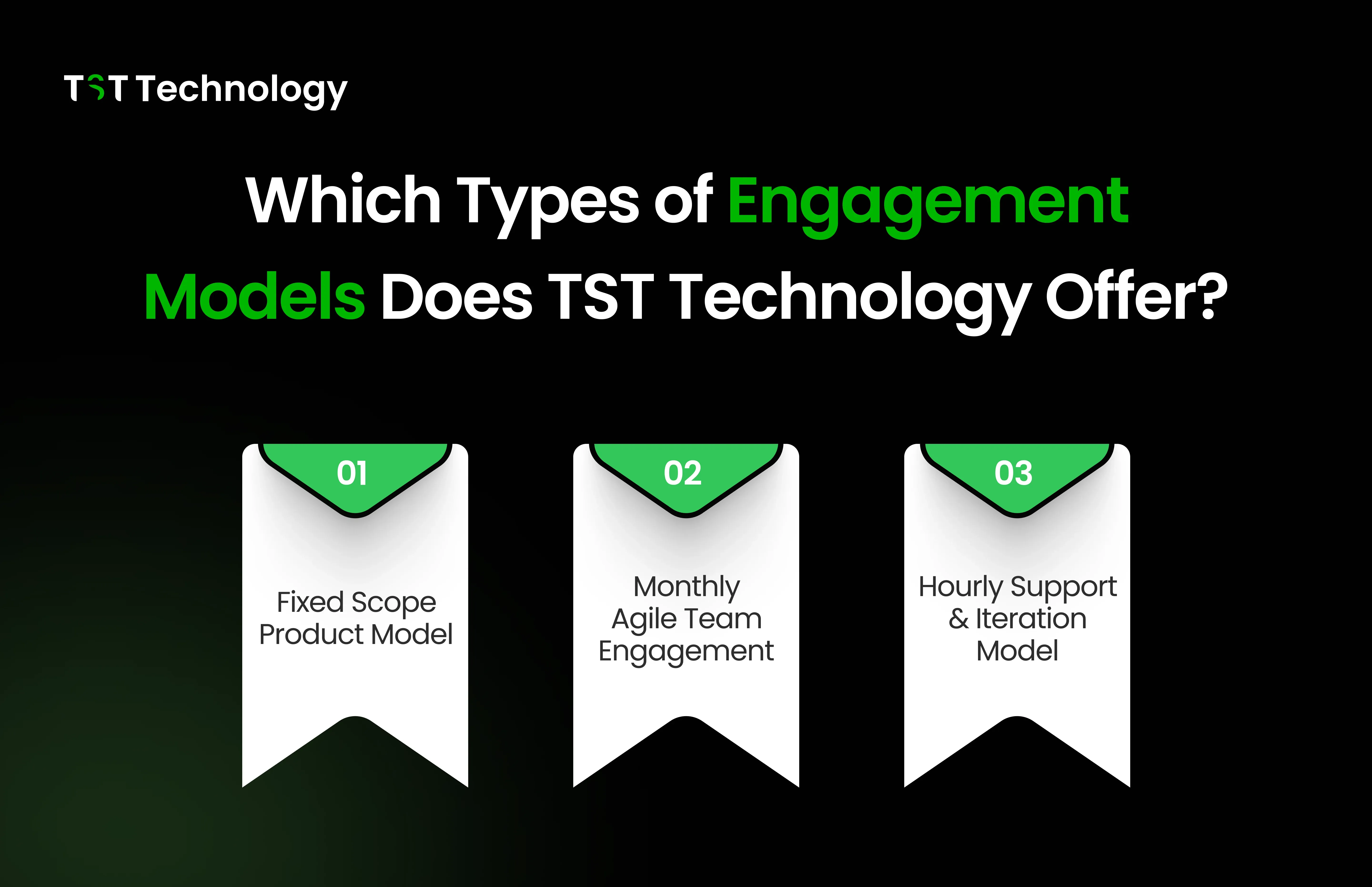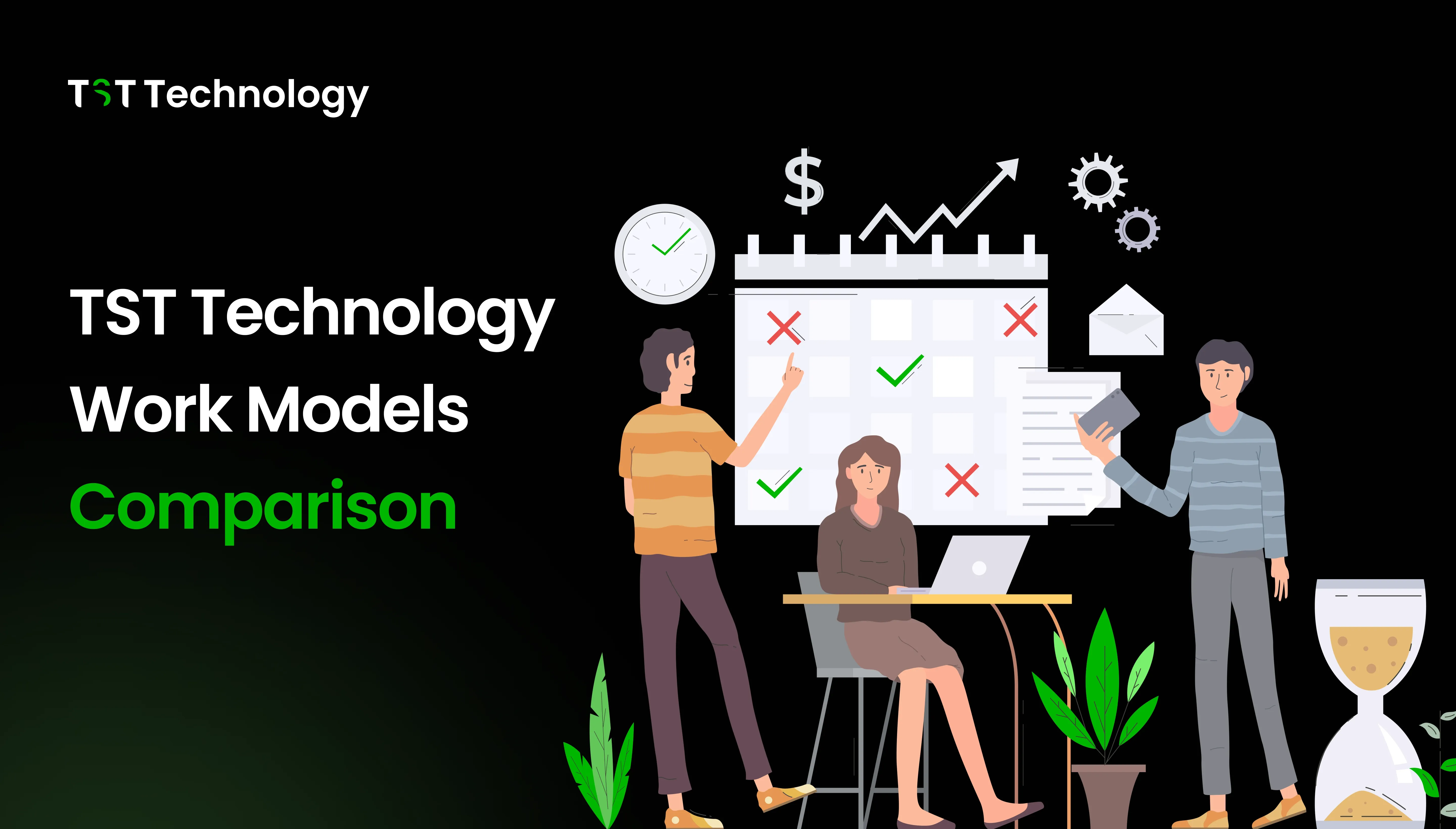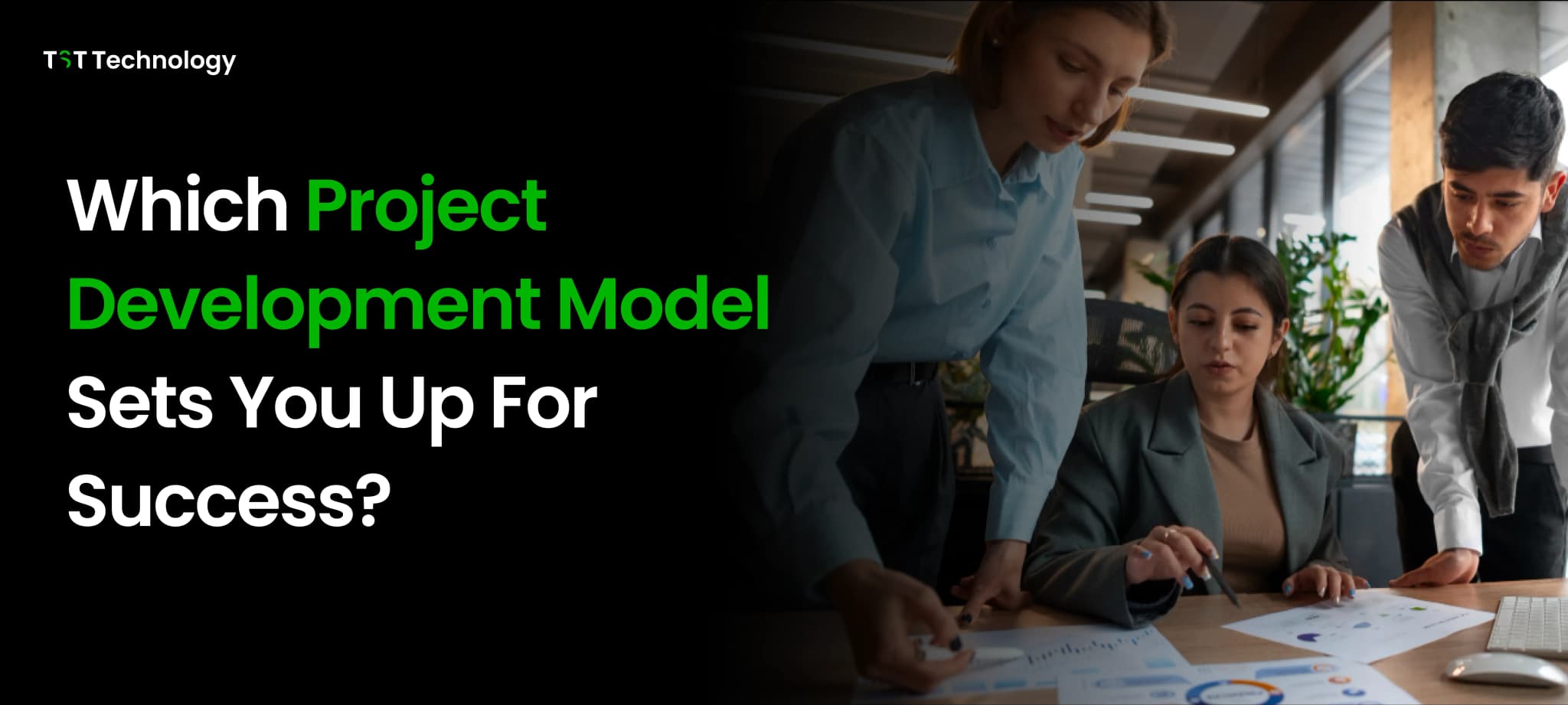What your project is about is very important. Even more important is how the development company makes it.
Why?
If your project is ever-changing, growing, and adapting, but the development is set in stone, then your product is outdated until it reaches the end users.
If your project requirements are set in stone and you need it early, but the development mode is flexible, you end up wasting precious time, adding things to your product that you didn’t need to.
TST Technology provides adaptable engagement models customized to the objectives and working style of every client. From fixed-scope builds to agile collaborations or pay-as-you-go services, we offer the appropriate mix of control, transparency, and delivery, whether for startups creating MVPs or businesses spearheading innovation.
Which Types of Engagement Models Does TST Technology Offer?

TST Technology provides three different engagement models to assist customers in achieving an ideal fit for their project objectives and collaboration needs. Each model is tailored to accommodate a diverse work style, ranging from structured product delivery through to continuous development or ad-hoc assistance.
The modes that are available are the Fixed Scope Product Model to achieve one-time builds with clearly defined requirements, the Monthly Agile Team Engagement if the clients have long-term flexible development partnerships in mind, and the Hourly Support & Iteration Model for pay-as-you-go solutions, rapid updates, and maintenance work. This choice allows customers to collaborate most efficiently and transparently to bring their vision to existence.
TST Technology Work Models Comparison

TST Technology has three engagement models to suit various requirements: Fixed Scope Product for a one-off project or MVP with defined scope and milestone-oriented delivery, Monthly Agile Team Engagement for extended development with adaptive sprints, role-based team choice, and real-time visibility, and Hourly Support & Iteration for occasional support, minor tweaks, or upkeep with pay-as-you-go freedom and task-level visibility.
Every model strikes a balance between scope, flexibility, visibility, and cost to enable clients to select the best for their project stage and objectives.
Below is a comparison of the three engagement models offered by TST Technology that highlights their key features and differences:
Feature / Model | 🚀 Fixed Scope Product | 🏆 Monthly Agile Team Engagement | ⏱ Hourly Support & Iteration |
| Purpose | One-time build with fixed scope | Long-term work with a flexible scope | Pay-as-you-go for small updates |
| Scope Flexibility | ❌ No, fixed after SRS approval | ✅ Yes, flexible per sprint | ✅ Yes, task-based |
| Resource Selection | Team assigned by TST Technology | Choose roles like UI, Dev, QA, etc. | Use any team member as needed |
| Team Selection | Assigned | Choose any role | Task-based |
| Project Management & Support | The Project Manager gives updates only | The Project Manager helps plan and prioritize with you | The Project Manager works with you on a monthly model |
| Project Manager Included | ✅ Yes | ✅ Yes | ✅ Yes |
| Working Style | Milestone-based waterfall | Agile with sprints and Jira | Task-based with timesheets |
| Client Visibility | Updates per milestone | Daily updates via Jira and Slack | Logs and Jira board |
| Change Requests / Feedback | Needs a new estimate and approval | Included in sprints | Easy task-based changes |
| Transparency | Milestone only | Daily Jira + Slack | Task log + Jira |
| Min. Commitment | One-time project | 3 months minimum | 50-hour block |
| Pricing | 40-20-30-10 milestone plan | Fixed cost per role monthly | Fixed hourly rate |
| When to Choose | You have a clear MVP scope | You want to build and scale | You need part-time dev help |
| Deliverables | UI, Dev, QA, DevOps, Deployment | Same as fixed plus improvements | Tasks across any function |
| Best For | MVPs or small fixed projects | Full product development | Maintenance and minor updates |
TST Technology Work Models Explained in Detail
Fixed Scope Product Model
The Fixed Scope Product model is designed for customers who have a clearly defined MVP scope and would like to have a one-time project with fixed, unambiguous requirements. With this model, you can validate your product in the market with preset time, efforts and money (you can switch to a different model once your requirements change).
Once the Software Requirements Specification (SRS) is signed off, the project scope is frozen, encouraging predictability and control over timelines and budget. Any deviations after this involve a new estimate and formal approval, ensuring transparency and mutual agreement along the way.
Key points of this model are:
- TST Technology assigns the team, so clients do not choose individual resources.
- A project manager is included to manage the project and report at significant milestones, but there is limited day-to-day management and responsive planning.
- The working approach is a milestone-based waterfall process, with the project going through set stages with deliverables met at each milestone.
- Client visibility is provided through milestone reports instead of daily or sprint-by-sprint reports.
- Pricing is on a formal 40%-20%-30%-10% milestone payment schedule, tying payments to project progress and deliverables.
- Deliverables include the entire product cycle from UI, development, QA, DevOps, to deployment.
This model works best for projects with a well-defined, fixed scope where requirements are unlikely to change dramatically. It is ideal for teams or startups looking to create an MVP with a clear, measurable budget and schedule.
Additionally, it suits those who prefer traditional project management approaches, featuring less continuous change and comprehensive milestone reporting for greater predictability and control.
Monthly Agile Team Engagement
The Monthly Agile Team Engagement model is intended for clients who require long-term collaboration with the flexibility to continuously refine their product. It permits scope adjustments and feature prioritization on a sprint-to-sprint basis, making it suitable for projects that need to be adaptable and iteratively developed.
Customers can choose specific roles like UI designers, developers, or QA experts based on their requirements, and a project manager works in close coordination with them to schedule, prioritize, and manage the tasks efficiently.
Key points of this model are:
- Flexible scope with the option to add changes in each sprint.
- Agile work culture with frequent two-week sprints that are handled through Jira and communication facilitated through Slack.
- Daily updates with maximum visibility and ongoing client-TST Technology team collaboration.
- Feedback and change requests are seamlessly integrated as part of the sprint cycles without disrupting the process.
- A three-month minimum commitment provides continuity and greater depth of project involvement.
- Pricing is based on a fixed monthly fee per role involved, offering budget predictability with agility.
- Deliverables include UI, development, QA, DevOps, deployment, and continuous improvement.
This model works best with clients who desire to build, grow, and continuously refine their products using a responsive and open agile process that encourages close communication and flexibility throughout the lifecycle.
Hourly Support & Iteration Model
The Hourly Support & Iteration model provides an elastic, pay-as-you-go option for clients requiring frequent minor updates, support, or half-time developer support. In contrast to fixed or monthly arrangements, this model enables clients to employ any member of TST Technology's team according to task needs, with project management assistance akin to the monthly engagement model.
Key points of this model are:
- Full scope flexibility with task-based engagement is ideal for making small, incremental changes.
- Work is monitored via timesheets and controlled by Jira, promoting openness and responsibility.
- The customers are given logs and access to the Jira board for immediate monitoring of progress and time consumption.
- Change requests are simple and processed rapidly on a task-by-task basis without negotiating over hours.
- Minimum commitment is a 50-hour block, which is appropriate for startups or companies that need development assistance from time to time.
- Pricing is on a fixed rate per hour, offering cost control for workload variability.
- Deliverables include work in any function, such as UI, development, QA, DevOps, and deployment as required.
This model suits clients who need maintenance, light updates, or part-time flexible support without long-term contracts or fixed project scopes.
How to Choose the Right Model?

Choosing the right engagement model relies on the project's specific needs, scope, and flexibility preference of the client's project. Take into consideration the following to make the decision:
Select the Fixed Scope Product model if:
- There is a definite and fixed MVP scope for the project.
- There will be minimal changes during development.
- Milestone-based progress and guaranteed pricing are your preference.
Select the Monthly Agile Team Engagement if:
- You need long-term engagement with frequent scope revisions.
- Flexibility and adaptability by sprint are crucial.
- You desire daily reports and active participation in planning.
Choose the Hourly Support & Iteration model if:
- You require part-time developer assistance or an on-demand service.
- The scope includes small updates or maintenance work.
- You prefer to pay for only the hours billed with task-based flexibility.
Recognizing these differences ensures that project goals, budget, and schedule align with the most effective engagement model TST Technology provides.
To know more about the pricing of these models, check this out: PRICING BLOG LINK
Check out our top services to get started with your product development.
Conclusion
TST Technology specialises in delivering flexible engagement models to suit a broad array of project requirements, ranging from well-defined MVPs to changing products that need continuous development and support. Through the provision of the Fixed Scope Product, Month-to-Month Agile Team Engagement, and Hourly Support & Iteration models, TST Technology helps clients choose the collaboration type most conducive to their objectives, deadlines, and budgets.
This client-focused strategy prioritises transparency, flexibility, and specialist delivery to build strong relationships and effective results. Every engagement model is designed to provide the appropriate balance of control, flexibility, and collaboration to allow clients to concentrate on their core business while TST Technology manages the technical delivery.
Why delay your growth further? Schedule a Free Consultation Call with TST Technology to find the ideal solution for your project. For more business growth insights, visit our blog and resources library and grab all you need.






